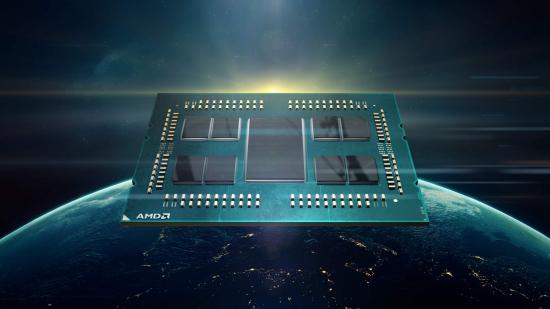AMD has officially launched its EPYC 2 server chips, nabbing major server providers such as Google and Microsoft in the process. Over at its EPYC launch event, AMD officially unleashed its latest 7nm Zen 2 processors with the 64-core/128-thread AMD EPYC 7742 leading the charge to claim market share from Intel.
This is a colossal fight for AMD, and, if we’re honest with ourselves, trumps the gaming desktop front as the most important battle between team red and chipzilla right now. Just look at the numbers we’re talking, the EPYC 7742, the 64-core/128-thread chip, will set you back $6,950 a piece, and that’s with a bulk buy discount on a tray of 1000 units.
Just like Ryzen 3000, EPYC is built upon the Zen 2 microarchitecture and utilises the 7nm process node from TSMC. Just like their desktop counterparts, each Zen 2 core will feature a 15% IPC increase. But not only is AMD targeting performance improvement with its new chips, it’s also going after reducing total cost of ownership. And that’s something that’s appealing to many hyperscalers, the most prolific and sizeable tech giants in the game.
Among AMD EPYC’s esteemed clients are Cray, HPE, Twitter, Google, Microsoft, Dell, VMware, and Lenovo.
“Twitter is committed to reducing our environmental impact of our datacenters by finding innovative ways to increase efficiency. The 2nd Gen AMD EPYC processor provides us the sweet spot of performance and energy consumption that we need to honor that commitment, while supporting the high traffic volume on our platform,” Jennifer Fraser, senior director of engineering at Twitter, says. “Using the AMD EPYC 7702 processor we can scale out our compute clusters with more cores in less space using less power, which translates to a 25% lower TCO for Twitter.
I won’t list all 19 EPYC SKUs AMD is releasing – you can find the full list here – but these are the top chips taking the fight to Intel’s overwhelming server dominance:
| Model | Cores | Threads | Base (GHz) | Max boost (GHz) | Default TDP (w) | L3 Cache (MB) | 1Ku (1000 unit) pricing |
|
7742 |
64 | 128 | 2.25 | 3.40 | 225w | 256 | $6,950 |
|
7702 |
64 | 128 | 2.00 | 3.35 | 200w | 256 | $6,450 |
|
7702P |
64 | 128 | 2.00 | 3.35 | 200w | 256 | $4,425 |
|
7642 |
48 | 96 | 2.30 | 3.30 | 225w | 256 | $4,775 |
With 2nd Gen EPYC out the gate swinging, the pressure is ramping up rather considerably on Intel to compete. The company has officially launched its 10nm mobile parts – the flagship Dell XPS 2-in-1 is now available to order (via PCWorld) – but server components built upon this node and fitted with the Sunny Cove core aren’t expected until next year at the earliest.
